
Publisher:
Bonnie King
CONTACT:
Newsroom@Salem-news.com
Advertising:
Adsales@Salem-news.com

~Truth~
~Justice~
~Peace~
TJP
May-18-2011 04:44


 TweetFollow @OregonNews
TweetFollow @OregonNews
Interview by Tim King with Agron Belica, Dr. Jay R Crook, and Dr. Laleh Bakhtiar
Salem-News.comIncludes the release of Agron Belica's new song: 'Sermon from the Throne'.
 Clockwise from top left; Agron Belica, Dr. Laleh Bakhtiar, Tim King and Dr. Jay R Crook. Patrick Drier photo (below) courtesy: Kristina Iftikar |
(SALEM, Ore.) - Tim King: Agron, you mention in your song that the Prophet Yahya (John the Baptist) was not beheaded. Explain to me the words in your song, “The Quran does not agree, and history never said it”
Agron Belica: The Quran does not agree—does not accept the beheading of Yahya (PBUH). Author Agron Belica
If a Muslim accepts this fabricated story of the beheading, then he should know it is inconsistent with the text of the Quran: “God has sent down the fairest discourse, a Book, one that is consistent in its often repeated parts of the Quran by which shiver the skins of those who dread their Lord.” (Q. 39:23) 
In the Quran, we read this verse with respect to Jesus (PBUH): “And peace be on me the day I was given birth and the day I die and the day I will be raised up, living.” (Q.19:33) When asked what this means, the answer is quite obvious to a Muslim; that God gave him security in these three circumstances; that is, God saved him from the hands of his enemies. Now listen to the exact words of the Quran regarding Prophet Yahya: “And peace be on him the day on which he was given birth and the day he dies and the day he will be raised up, living.” (Q. 19:15) The two references are identical, except in the verse about Jesus, he is speaking, while in the verse about the Prophet Yahya it is being said by another—God—about him.
This particular verse about Yahya aroused my curiosity. Since the most popular Quranic Commentary studied in the Muslim World is that of Ibn Kathir (Tafsir Ibn Kathir), I turned to that to see what has been said. I find the same things said about Jesus by Muslims also said about Yahya, but here it is from the scholar’s own mouth: that Yahya was given safety and security in these three circumstances: birth, death, and being raised to life again.
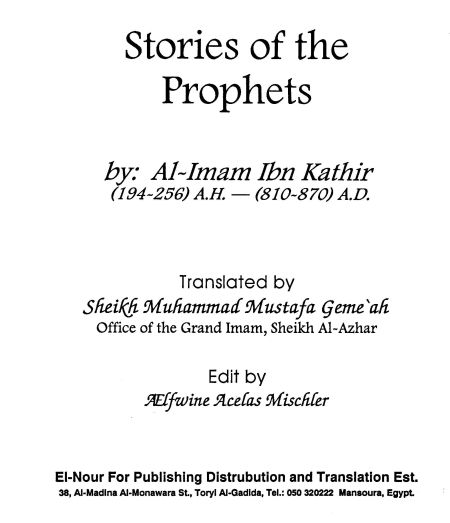 |
I then took a look at the cover of a book, Stories of the Prophets, the title of which seemed to imply that this was a selection of stories from the much larger Commentary of Ibn Kathir. It states “by Ibn Kathir.” One would assume that the book contains stories translated into English by Sheikh Muhammad Mustafa Geme’ah from the complete Commentary of Ibn Kathir, much as our colleague Dr. Crook has done in his series comparing the Biblical and Islamic stories of the Prophets using the Persian Quranic Commentary of Surabadi, The Bible: An Islamic Perspective.
However, when I turned to the story of Yahya, I was shocked to find that the text included a version of the New Testament story of Yahya’s beheading. Puzzled— how does having one’s head being chopped off make one safe and secure? The Arabic Commentary of Ibn Kathir does not contain the tale of the beheading yet here it was in this book! A translator is not supposed to intrude his own embellishments into a faithful translation. I could not believe my eyes, Tim. I called my friend Dr. Crook to see what he thought about this anomaly. As it happened, he had a copy of the book. He got it down and began to examine it. He asked me if I had read the Translator’s Note at the beginning of the book? I confess that I had not, so he began reading it to me. I mean, whoever reads the translator’s notes, right?
Tim King: (laughing): Right!
Agron Belica: As it happens I have it here. Let me read it for you; listen and learn!
“We have elected to simplify the translation to suit the foreign reader.
We deleted all the controversial passages; therefore, this text covers
most of the important points which are relevant today”
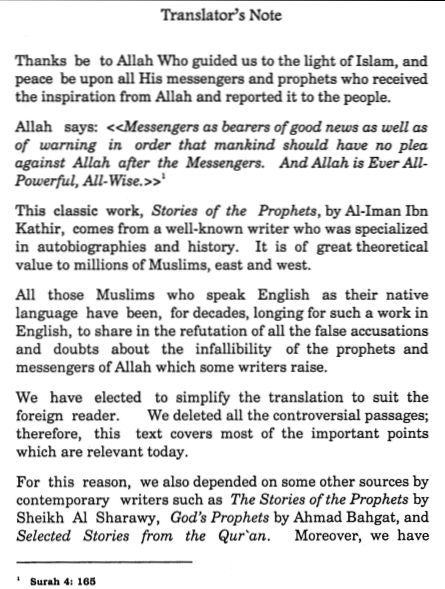
If this were not bad enough, sections from other works have been included that are not from the hand of Ibn Kathir:
“For this reason we also depended on some other sources by contemporary writers such as The Stories of the Prophets by Sheikh Al’ Sharawy, God’s Prophets by Ahmad Baghat, and Selected stories from the Quran,” —Sheikh Muhammad Geme’ah
All this under the banner of Imam Ibn Kathir. May God denounce such misleading fabrications.
Tim King: Well, at least the translator was honest about it.
Agron Belica: Means nothing, Tim . “A parable of those who were ungrateful for their Lord, their actions are as ashes over which the wind blows strongly on a windy stormy day. They will have no power over what they have earned. That is the wandering far away, astray” (H.Q. 14:18)
Tim King: Keep going, Agron.
Agron Belica: It is quite obvious what was meant by Ibn Kathir in his commentary of this Quranic verse (Q. 19:15) about the Prophet Yahya’s being given peace by his Lord.
Tim King: It makes sense. Can you be more specific about what the Quran says in this regard?
Agron Belica: Inshallah! If we look in the Quran, we see that other
prophets were given peace, safety, and security as well.
Here are a few examples:
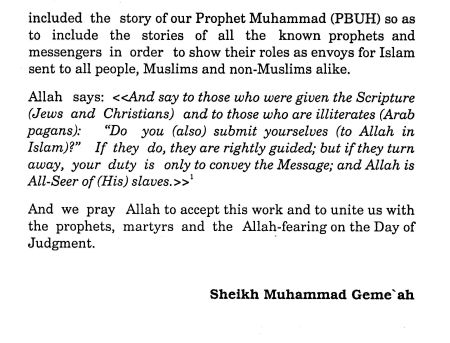
“And, certainly, Noah cried out to Us. And how excellent were the ones who answer! And We delivered him and his people from tremendous distress. And We made his offspring—they, the ones who remain. And We left for him to say with the later ones: Peace be on Noah among the worlds. (Q. 37:79)
“And, certainly, We showed Our grace to Moses and Aaron. And We delivered them and their folk from the tremendous distress and helped them so that they, they had been the ones who are victors. And We gave them the manifest Book and guided them to the straight path. We left for them a good name with the later ones: Peace be on Moses and Aaron! (HQ 37:114-120)
“Truly, he was of Our servants, ones who believe. And, truly, Lot was of the ones who are sent. We delivered him and his people, one and all, but an old woman of the ones who stay behind. Again, We destroyed the others.” (Q. 37:133-136)
“Then, the great fish engulfed him while he was one who is answerable.
If he had not been of the ones who glorify, he would have lingered in expectation
in its belly until the Day they are raised up.” (Q. 37:142-144)
Sermon from the Throne from Tim King on Vimeo. 'Sermon from the Throne' - by Agron Belica (Lyrics posted below) |
All of them, plus Jesus, and Muhammad—as far as we know, all the prophets mentioned by name in the Quran were delivered from their enemies. Yet, the Prophet Yahya, whose name ironically means He Who Lives, is popularly supposed to have been put to death. Clearly, you can see how this story of the beheading creates an inconsistency with a text that we believe is internally consistent.
Tim King: Right! Right! Agron, one question before I continue. You say that Prophet Yahya was given peace by his Lord, but your theory is that he was put on the cross in place of Jesus in a case of Mistaken Identity. How does this fit in with the peace and safety reported in the Quran with regard to other prophets?
Agron Belica: My theory that Prophet Yahya was put on the cross would in no way compromise the peace of God given to other prophets, such as Abraham who was given the same peace, but thrown into the fire and rescued from it by the Almighty. “We said: O fire! Be coolness and peace for Abraham! (Q. 21:69) “Peace be on Abraham! Thus, We give recompense to the ones who are doers of good. (Q. 37:109-110) I believe Prophet Yahya was put on the cross, but he lived; hence, his name Yahya, “he who lives.”
Tim King: Very interesting! As far as the Quran is concerned, it is clear how the text implies a refutation of the story that John was beheaded. This belief, that prophet Yahya was beheaded, cannot be accepted. You also mention that history never said it. Now, if I am not mistaken, Josephus, a first century Jewish historian, in his Antiquities of the Jews makes mention that John the Baptist (Prophet Yahya) was arrested and put to death. How do you explain this?
Sermon from the Throne:
Song by Agron Belica (featuring Patrick Dreier) Produced by DJ Naydee & Julian Baker –Beats Planet Productions Co-Produced by Patrick Dreier & Agron Belica-
The truth now revealed: sermon from the throne; Listen here, man, I’m gonna tell you a little story, Reflect when the tyrant ordered the infant massacre— One was saved, while the other never even mentioned; The book of remembrance, man, now in my possession; The truth now revealed: sermon from the throne; Brood of vipers, hypocrites—a harsh reprimand! The truth now revealed: sermon from the throne; The master of his people, one who had authority, The name is Agron, but everyone can call me Aaron; This is the base if your looking for the guidance; ______________________________________ |
Agron Belica: Interesting you make mention of this, Tim. First of all, Josephus was not an eye witness to this event, but heard of it from hearsay. He does, however, make mention of the arrest and execution of Prophet Yahya. If the popular story circulating at that time was that John the Baptist was beheaded, why then did Josephus not make mention of the manner of his death? Simply put, in his work, Josephus makes reference to many arrests and executions of Jews by crucifixion. According to Josephus almost half the Jewish population was crucified. We are told by Josephus, that prophet Yahya was put to death because of his political importance. If it be true that Prophet Yahya was put to death by Herod Antipas on the suspicion of planning an insurrection as Josephus indicates, the punishment would not have been beheading. Under Roman law, only Roman citizens were sentenced to beheading. Any non-Roman citizen was sentenced to death by crucifixion for such activity. This was the case with Jesus according to the gospel scholars, a non-Roman citizen, being accused of treason and sentenced to crucifixion. In addition, we see that when Paul was sentenced to die, he pleaded that he was a Roman citizen so that he would be beheaded and not crucified (Acts 22:27-28).
Agron Belica: Make sense?
Tim King: So far.
Agron Belica: Certainly, if it is the case that Prophet Yahya’s followers were many, spread far and wide, as it has been reported by some, and that Josephus mentions that the Jews were greatly moved by Prophet Yahya’s words, and that Herod Antipas feared that Yahya's influence over the masses would cause a rebellious uprising leading to a revolt by the Jews against the Romans (Antiquities 18:5.2 116-119), then this would be in accord with the practice of capital punishment of said criminals under Roman law; that is, that non-Roman citizens be crucified.
Agron Belica: Was Prophet Yahya a non-Roman citizen?
Tim King: He certainly was!
Agron Belica: Then, in all fairness, because the manner of death was not mentioned, one would have to assume the obvious, that he was put on the cross as Josephus reports many Jews were. However, Josephus was not an eye witness to the event. This is where my theory comes into play about Prophet Yahya being put on the cross in a case of mistaken identity (shubbiha) and not Jesus, and his—Yahya’s—surviving the ordeal.
Tim King: And the story of the beheading found in the New Testament?
Agron Belica: Perhaps you should ask Dr. Crook about that. It is my belief that there was only one arrest and alleged execution that took place and that was of the Prophet Yahya not Jesus, in 36 AD, as some modern day scholars are placing the supposed crucifixion of Jesus these days. It is my belief the crucifixion of Jesus never happened, and what’s mentioned in Josephus’ work about Jesus and the cross is an interpolation, according to many critical scholars. Some would disagree of course, but too much doubt has been cast upon it for it to be considered authentic.
Tim King: Dr. Crook, perhaps you could tell us a bit about the problems with the beheading story. As I understand it, you investigated the chronology. Had you raised the issue before?
Dr. Crook: Yes, I discussed the problem in passing in The New Testament: An Islamic Perspective that was published several years before I came to know Agron Belica or his theories. Taken alone, the story of John’s being beheaded at the behest of Herod’s daughter-in-law makes good reading. Richard Strauss’ opera based on the story, Salome, is one of my favorites. The problem arises when one tries to correlate the Biblical story with the writings of Josephus. As Agron has pointed out, Josephus was not a witness to these events, but rather reporting them as an historian does. Josephus was born c. 37 or 38 CE and died about the year 100. Most Biblical scholars date the alleged crucifixion of Jesus at 29 or 30 CE; some, however, opt for a later date. Be that as it may, the gospels are absolutely clear that the beheading of John took place before the crucifixion.
Tim King: Yes, in the first year of Jesus’ mission, I believe.
Dr. Crook: That is correct. That would make John’s death about 27 or 28 CE.
Tim King: What is the problem with that?
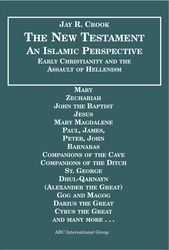 Order from islamicbookstore.com |
Dr. Crook: Just this, Josephus’ account of the imprisonment and execution of Yahya for historical reasons that are discussed in Agron’s book, The Crucifixion: Mistaken Identity? and also an essay devoted to the subject written after Agron got me interested in the matter, Rethinking John the Baptist (included in Agron’s Book)—that account would place it in the middle of the fourth decade, say 35 or 36 CE and therefore years after the events of the crucifixion, not before.
In The New Testament: An Islamic Perspective, I wrote, “Josephus’ evidence creates a colossal chronological problem of enormous consequences.” That is still true. Since we also know that while the gospels portray John in their narratives primarily to introduce and testify to Jesus’ superior stature, we also know from Josephus, that John or Yahya was a major player on the Palestinian stage, not just a walk-on to herald the messiahship of Jesus.
Tim King: Why should we trust Josephus over the Gospels?
Dr. Crook: Why not? We know that the gospels were written to present Jesus from a more or less Graeco-Roman point of view, downplaying Jesus’ Jewishness. Many criticize Josephus for his desertion of a lost cause during the Jewish War, but he had no axe to grind concerning John. In fact, he seems to have admired him. In any event, Josephus’ evidence makes Agron Belica’s theory of John’s being on the cross possible. His theory cannot be dismissed out of hand for chronological reasons. I admire his work in bringing this much neglected prophet out of the shadows of comparative obscurity and restoring him to his rightful place as one of the major religious figures of human history. He is to be congratulated.
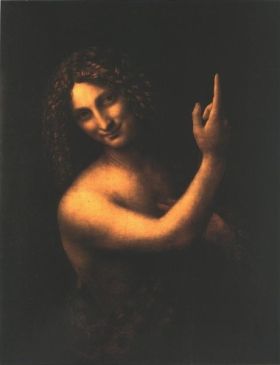 Leonardo- da Vinci's painting - St John the Baptist |
Tim King (turning back to Agron Belica): It seems as if Josephus depicts the Prophet Yahya (John the Baptist) as a powerful figure.
Agron Belica: Yes. And let me say that the Quran corroborates this as well: “O Zechariah! Truly We give you the good tidings of a boy. His name will be Yahya and We have not assigned it as a name-sake for anyone before.” (Q. 19:7) This Arabic word (samiy) is used twice in the Quran, once in reference to Yahya, and the other time it is used is in reference to God. “…Know you any name-sake for him (samiy) for Him ?” (Q. 19:65) In the famous Arabic lexicon Lisan al-Arab, the root
s m w means “elevation or highness.”
How significant is that, Tim?
Tim King: Very significant and very impressive!
Tim King: You also mention a wise man requests a protector from his Lord?
Agron Belica: Yes. Zachariah prays to his Lord for a protector. The key word here is waliy in 19:5, and other places in the Quran, it means “protector” rather than “heir” or “successor.” In this specific case, Zechariah prayed to his Lord: “And truly I have feared my defenders after me and my wife has been a barren woman. So bestow on me from that which proceeds from Your Presence a protector (waliy).”
 Zachariah prayed to his Lord for a protector. |
His prayer for a protector was answered by God’s giving him a son, one with spiritual authority (sayyid) in chapter 3:39, “Then the angels proclaimed to him while he was one who stands invoking blessings in the sanctuary that God gives you good tidings of Yahya—one who establishes the word of God as true—a chief and a concealer of secrets and a prophet, among the ones who are in accord with morality.”
It is commonly thought that Zachariah was simply asking for a son; however, this misconception may be corrected by reading further into the text. After receiving this good news, Zachariah asked, “My Lord! How is it I will have a boy while surely I have reached old age and my wife is a barren woman.” Zachariah was asking how this would be possible, as he had not even contemplated being blessed with a son in his old age, and that with a barren wife.
If Zachariah were asking for a son, as has been suggested by many Muslim scholars, why then did he ask such a question when God informed him of the impending birth? The truth is that Zachariah had not been asking explicitly for a son. He was asking God to send him a protector, from the same place where Mary received her provisions (rizq); hence “Give me from Your presence a protector (waliy)’ (Q. 19:5, 3:38).
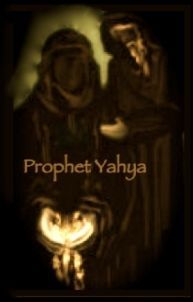
If Zachariah wanted a son so badly as has been suggested by many Muslim scholars, then why did he not just take a second wife? Polygamy was practiced in that time; this would be in accordance with the tradition of Abraham, whose wife Sarah was barren. Therefore, he married Sarah’s maidservant Hagar to father a child.
John the Baptist was of Levitical descent, and it is well known that the Levites were protectors/guardians of the sacred precincts. Yahya ultimately became the protector/guardian of a sacred word: Messiah Jesus.
The Quran tells us that the Jews accused Mary of playing the harlot. That would make Jesus an illegitimate child. This accusation can be found in later Jewish traditions. If this be true, then Mary faced the threat of being thrown alive into a blaze of fire, as prescribed by Mosaic law: “and the daughter of a priest, if she profanes herself by playing the harlot, profanes her father; she shall be burned with fire” (Lev. 21:9). As for Jesus’ being labeled an illegitimate child, Jewish law states, “no bastard shall not enter the assembly of the Lord, even to the tenth generation, none of his descendants shall enter the assembly of the Lord” (Deut. 23:2).
Jesus only revealed himself to a select few as an adult. Little wonder then that Jesus is so mysterious to the point that today some even deny the reality of his ever having existed. It was John the Baptist who would face the great opposition and not Jesus, and this is why I believe that God told him, “O Yahya, take the book with strength, and We gave him critical judgment while a lad.” (Q. 19:12)
Tim King: Very interesting!
Agron Belica: Tim, I want to add something before we end. If the title Messehu Esa is an exclusive one for Jesus in the Muslim tradition, then the title Sayyidina Yahya should also be an exclusive one for Yahya (John the Baptist). No one in Islamic history from the beginning of time until the present day has deserved this honorable title more than the son of Zachariah.
They were prophets of success not failure. Prophet Yahya features as a major player in this messianic story. The ungrateful tried to dismiss him from the story, but as God says, “They want to extuinguish the light of God with their mouths, but God refuses so that He may fulfill His light even though the ones who are ungrateful dislike it” (Q. 9:32) Also, “O humanity! Surely there has drawn near to you proof from your Lord. And We have sent forth to you a clear light.” (Q. 4:174)
Tim King (turning to Dr. Bakhtiar): Dr. Bakhtiar, I am well-aware of the wonderful work you have done to undo an over 1400 year misinterpretation of the Quran no longer allowing Muslim husbands to beat their wives with your Sublime Quran translation and, this, the masterful Concordance of the Sublime Quran that you published which proves that the method of formal equivalence that you used in translating the Quran works. I also know that your translation is the only one that translates the word hasur as “concealer of secrets” in reference to John the Baptist or, as the Quran calls him, Yahya. As you are clearly aware of the work of Agron Belica on John the Baptist, do you believe that John the Baptist was on the cross instead of the Christian belief that it was Jesus on the cross?
Dr. Bakhtiar: Thank you, Tim. I believe that it certainly is a possibility.
Tim King: What difference would it have made if John the Baptist had been on the cross instead of Jesus?
Dr. Bakhtiar: That is a very important question, and the answer is not simple.
Let me begin by saying that it is not a universally held Christian belief that Jesus died on the cross to save us from sin. The sin, by the way, that he is saving us from is the original sin committed by Adam, or in some cases the belief is that Eve committed this sin and then the belief expanded to include all sins that I commit in my lifetime.
As a Muslim, I do not believe in original sin or that anyone died to save me from my sins, but that I am accountable to God only for my sins, the sins I commit. Therefore, we would have to let go of the idea of original sin.
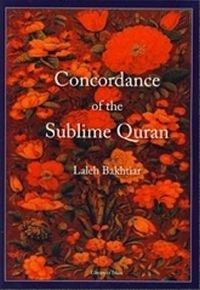 Visit: sublimequran.org/concordance |
Secondly, as a Muslim I believe in One God, not Three. I am joined by many Christian groups in this belief, Christians like the Unitarians, Christadelphians, Christian Scientists, Iglesia ri Cristo, Jehovah's Witnesses, some groups of Latter Day Saints, Oneness Pentecostals and the United Church of God. Therefore, I could be considered to be a Christian from one of these groups as far as the belief in the Trinity is concerned.
As a Muslim, I believe that Jesus was the Messiah, that he was born of the Virgin Mary, that he spoke from the cradle and performed many miracles during his lifetime. I believe that he was gathered or raised to God, living to return at the end of time. These are the beliefs of Muslims in regard to Jesus, the Christ. By the way, the pastor who burned the Quran unfortunately also burned the name of Jesus Christ in his ignorance about Islam.
I also believe that Jesus did not die on the cross, but that “a likeness to him of another was shown to them.” Based on the work that Agron Belica has done, it is certainly possible that the “likeness of Jesus” could very well have been his first cousin, John the Baptist.
Having said that, what difference would it have made if John the Baptist had been on the cross instead of Jesus?
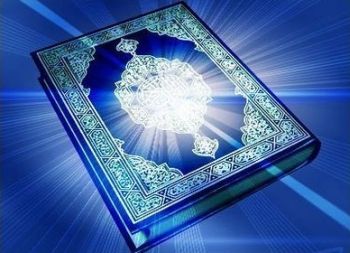
The most conclusive arguments in Islamic tradition to prove or disprove something is to use the Quran to prove another point in the Quran. This Agron Belica has done in his work on John the Baptist, in particular, John having been a concealer of secrets1. Therefore, John, the concealer of secrets, by being on the cross would have shown the world the highest virtue, that of altruism. He would have been willing to die in place of the Messiah so that the Messiah could continue his mission.
If Jesus was not crucified, and John was in his place, all of humanity could come to agree that Jesus was a Messiah. This would include Jewish and Muslim belief as well as Christian belief. There would be agreement. The Jewish people are still waiting for the first coming of a Messiah. The Muslims and Christians are waiting for the second coming of the person they recognize as the Messiah, Jesus Christ. Buddhists and Hindus and people of all other faiths would have no theological issues with Jesus being a Messiah.
Therefore, if all Christians could recognize the messiahship of Jesus and not insist that a person believe in Jesus having died on the cross to save them from sin, there would be peace among the people of faith. All would be working together in an altruistic, compassionate way to prepare for the coming of the Messiah. For some it would be the first coming and, for others, the second coming, but all would agree that would be the fulfillment of the Quranic description of John: “Peace be on him the day on which he was given birth and the day that he dies and the day that he is raised up, living” and the words of Jesus: “Peace be on me the day I was given birth and the day that I die and the day I am raised up, living.”
(All verses used quoted in this interview are from Dr. Laleh Bakhitiar’s English translation of the Holy Quran, The Sublime Quran.)
* * *
Prophet Yahya as Concealer of Secrets;
see for yourself:
In his The Revival of the Prophet Yahya, Agron Belica writes: “The word ‘hasur’ used in the Quran (Q. 3:39), which is usually translated ‘chaste,’ is a misinterpretation. My research shows that the Arabic word hasur does not mean ‘chaste’ with regard to Yahya; rather, it means ‘a concealer [of secrets].’
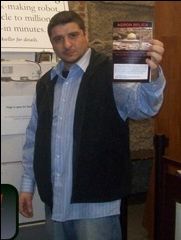 Agron Belica with his book: |
Why the mistake in translation and commentary? As there was no extensive information given in the Quran about the life of Prophet Yahya nor in the Tradition (hadith), the commentators then turned to Christian tradition and simply repeated what they found there.” Nonetheless, the commentators of the Quran have placed considerable emphasis on this word. Al-Tabari interprets the word “hasur” to mean one who abstains from sexual intercourse with women. He then reports a Tradition on the authority of Said ibn al-Musayyab which has Prophet Muhammad saying the following: “Everyone of the sons of Adam shall come on the Day of Resurrection with a sin (of sexual impropriety) except Yahya bin Zechariah.’ Then, picking up a tiny straw, he continued, ‘this is because his generative organ was no bigger then this straw (implying that he was impotent).’”
Does this mean that even the prophets outside of Yahya will be raised up with this sin of sexual impropriety? How can we accept that this was said by such a modest human being, comparing a straw to another prophet's generative organ? Was Yahya impotent?
One commentator, Ibn Kathir, a renowned Islamic scholar, rejects this view and adds, “This would be a defect and a blemish unworthy of prophets.” He then mentions that it was not that he had no sexual relations with women, but that he had no illegal sexual relations with them. Indeed, the whole discussion is unseemly.
It is known that prophets of God are immune from major sins, so this statement makes no sense at all when interpreting the word, hasur.
In addition, I would like to mention the fact that in his commentary, Ibn Kathir says he (Yahya) probably married and had children. He said this on the basis of what was related in the Quran of the prayer of Zachariah. There are several reasons why interpreting hasur in this context as “chaste” or “celibate,” as has been done by some commentators, is a misinterpretation: First of all, there is another word in the Quran for “chaste” and that is “muhsin.” As God used a different word with hasur, it must mean something different.
 Agron and the colors of his heritage. |
Secondly, God says in the Quran that Islam did not bring monasticism but that it was something that they (the Christians) invented. (Q. 57:27) Also, And verily We sent messengers (to mankind) before thee, and We appointed for them wives and offspring, and it was not given to any messenger that he should bring a portent save by God’s leave. For everything there is a time prescribed. (Q. 13:38) This is definitely not a recommendation for monasticism. Furthermore, we find in the Traditions that the Prophet said that there is no monasticism in Islam. Therefore, God would not have sent a Prophet who was celibate. In addition, it is contrary the exhortation in the Torah to “go forth and multiply.”
Thirdly, Yahya’s father, Zechariah prayed for a protector who would provide descendants (dhurriyah) for his family. There Zachariah called to his Lord; he said: My Lord! Bestow on me good offspring from Thy presence; truly Thou art hearing supplication. (Q. 3:38)
God gave him Yahya. God would not have sent a son to Zechariah who would not carry on the line of Jacob’s descendants because then God would not have answered the prayer of Zechariah.
The word hasur is used only one time in the Quran and that is in regard to the Prophet Yahya. A major Arabic-English lexicon, that of Edward William Lane (Taj al-Arus) states that when 'hasur' is used alone, it means “concealer [of secrets].”
In his translation, of Ibn al-Arabi's Book of the Fabulous Gryphon, Elmore also translates the Arabic hasur “as concealer [of secrets].” In the referenced passage, “chaste” would not have been appropriate (Gerald T. Elmore, Islamic Sainthood in the Fullness of Time, Brill 1999, P. 482)”
The full text of “The Revival of the Prophet Yahya” may be found on the website www.islammattersnow.com.
“Nay! We hurl the Truth against falsehood so that it prevails over it. That is when that which is falsehood vanishes.” (Q. 21:18)
Editor's Note: If all of Agron Belica’s research and the conclusions he draws from it prove to be valid, then the traditional view of John the Baptist/Yahya, both scholarly and conventional, Jewish, Christian and Muslim, will be subjected to a tidal wave of revision and reconsideration. This will also affect most extant translations of the Quran into English, with the exception of The Sublime Quran by Dr. Laleh Bakhtiar which incorporates all of his results that relate to Quranic verses. Additionally, the great collections of medieval Islamic commentaries, both Sunni and Shia, which often repeat such colorful Biblical stories as the beheading of John the Baptist, will have to be viewed more critically. Such revisionism is sure to meet with a strong opposition.
__________________________________
Tim King: Salem-News.com Editor and Writer
Tim King is a former U.S. Marine with twenty years of experience on the west coast as a television news producer, photojournalist, reporter and assignment editor. In addition to his role as a war correspondent, this Los Angeles native serves as Salem-News.com's Executive News Editor. Tim spent the winter of 2006/07 covering the war in Afghanistan, and he was in Iraq over the summer of 2008, reporting from the war while embedded with both the U.S. Army and the Marines.
Tim holds awards for reporting, photography, writing and editing, including the Silver Spoke Award by the National Coalition of Motorcyclists (2011), Excellence in Journalism Award by the Oregon Confederation of Motorcycle Clubs (2010), Oregon AP Award for Spot News Photographer of the Year (2004), First-place Electronic Media Award in Spot News, Las Vegas, (1998), Oregon AP Cooperation Award (1991); and several others including the 2005 Red Cross Good Neighborhood Award for reporting. Tim has several years of experience in network affiliate news TV stations, having worked as a reporter and photographer at NBC, ABC and FOX stations in Arizona, Nevada and Oregon. Tim was a member of the National Press Photographer's Association for several years and is a current member of the Orange County Press Club.
Serving the community in very real terms, Salem-News.com is the nation's only truly independent high traffic news Website. As News Editor, Tim among other things, is responsible for publishing the original content of 82 Salem-News.com writers. He reminds viewers that emails are easily missed and urges those trying to reach him, to please send a second email if the first goes unanswered. You can write to Tim at this address: newsroom@salem-news.com
Articles for May 17, 2011 | Articles for May 18, 2011 | Articles for May 19, 2011

Quick Links
DINING
Willamette UniversityGoudy Commons Cafe
Dine on the Queen
Willamette Queen Sternwheeler
MUST SEE SALEM
Oregon Capitol ToursCapitol History Gateway
Willamette River Ride
Willamette Queen Sternwheeler
Historic Home Tours:
Deepwood Museum
The Bush House
Gaiety Hollow Garden
AUCTIONS - APPRAISALS
Auction Masters & AppraisalsCONSTRUCTION SERVICES
Roofing and ContractingSheridan, Ore.
ONLINE SHOPPING
Special Occasion DressesAdvertise with Salem-News
Contact:AdSales@Salem-News.com


Salem-News.com:

Terms of Service | Privacy Policy
 a Song for Prophet Yahya
a Song for Prophet Yahya Double D Recording Studio
______________________________________
Double D Recording Studio
______________________________________
All comments and messages are approved by people and self promotional links or unacceptable comments are denied.
Seth May 25, 2011 12:32 pm (Pacific time)
Thanks for this article very imfomative
Abdulah May 20, 2011 5:42 am (Pacific time)
"John the Baptist/Sayyidina Yahya" Love it! Big ups for Salem-News.Com My kind of people. Keep up the good work. Selam! O People of Truth! Selam!
Agron Belica May 19, 2011 11:00 pm (Pacific time)
@Diane: thank you Jersey girl
Diane May 19, 2011 9:23 pm (Pacific time)
Wow! Great article! This story is amazing!!!! Mr. Belica delivers a brutal blow to Christian and Islamic traditions. I like this guy Tim. Thanks for sharing..
AGRON BELICA May 19, 2011 6:31 pm (Pacific time)
@Mr. Bardyl Polozani: Thanks a million!!!
AGRON BELICA May 19, 2011 6:29 pm (Pacific time)
@Adelina: Thanks!
Adelina May 19, 2011 4:54 pm (Pacific time)
Tim, great article!!! As an albanian I am proud of agron's work and wanted to thank all of the participants for their hard work and dedication to such interesting topic. It opened my mind to a whole bunch of new ideas. Mind blowing!!!! E pelqeva shume kete artikull dhe shpresoj te lexoj me shume ne te arthmen. (I really enjoyed this article and hope to read more in the future). thank you, Tim King
Jay R. Crook May 19, 2011 7:32 am (Pacific time)
Many thanks to Tim and his diligent team for the presentation and layout. Their willingness to give views suppressed or out-of-sync with establishment dogma a hearing is most heartening. i enjoyed the opportunity to be a part of this intellectual revolution being fought with ideas, not bullets or force majeure.
Bardyl Polozani May 18, 2011 7:38 pm (Pacific time)
I must say that Agron is one interesting individual, here comes out of nowhere this man out of the blue and he abuses professors and scholars alike, Hahaha. It kills me to know that a young man can come along and just ruin someones work like he does. This brother has no formal education and he is destroying some of the most historical theories of our time and times of old. He's taking their work and their history and abusing them with it, my stomach hurts from laughing so much. People print whatever they want and the public believes it, it really is scary when u think about it. I have been a student for a few years now and I must say Ahmad Deedat was an amazing teacher himself, I mention him to say this, Agron is just as he was except more dangerous in terms of knowledge and understanding. He will change history with his work and theories. This gentlemen has a G.E.D. and making scholars look like fools. God is big, he raises who he pleases and uses whom he pleases to accomplish his plans. Who would ever think that a high school drop out could ever make such a significant impact on religion and faith alike. My hat goes out to you and whether you like him or not, you cannot change what he has done to all of you scandalous , crooked , storytellers. Remember this, the gig is up! Following tradition is like driving a car while you are blind, it just doesn't work. Just like the person will eventually crash, the truth has appeared, finally. Bravo Agron, Bravo. Beefy
Agron belica May 18, 2011 4:52 pm (Pacific time)
@freeway: thanks!!!
Agron Belica May 18, 2011 4:49 pm (Pacific time)
@shareef: Thanks brother!
Freeway :) May 18, 2011 4:13 pm (Pacific time)
Now that dear editor was a great read. Salemnews never disappoints. Does the musician have an email contact? Would love some more information on this topic. Nice song sweetie and very good interview.
Editor: Thanks so much! Agron's email is agronbelica@gmail.com.
Br. Shareef- Harlem, New York May 18, 2011 1:37 pm (Pacific time)
Salam, This article should awaken the ignorant minded fools who persist on publishing fabrications about Prophet Yahya (John the Baptist). I have researched this as well, and I must say, that this research and new version of events does bang out traditional stories as far as the Prophet Yahya goes. His evidence is from the Quran, and as Dr. Bakhtiar said, "He disproves this beheading and everything that relates to prophet Yahya in Christian and Muslim tradition by explaining the Quran with the Quran. Job well done! Furthermore, the Shia Muslims love relating traditions by their so called infallible Imams who supposedly never make mistakes when it comes to religious matters of how Imam Hussein was martyred like Prophet Yahya. Well, according to what has so powerfully been presented in this interview published by Salem-News.Com, those so-called Holy Imams are not so infallible as their followers assume they are. My man just crushed centuries of tradition in both faiths Christianity, and Islam. Shame on that Islamic Scholar who translated "Stories of the Prophets by ebn Kathir ". Tampering of texts goes along way in religion, but fortunatly we have good people that expose this. I think the video and song by Mr. Tim King and Mr. Agron Belica was powerfully moving. God willing we open are minds and take this story of John the Baptist for what it is- fabrication. I can almost gaurantee that the challenge will never be met. Good work brother!
Laleh Bakhtiar May 18, 2011 7:14 am (Pacific time)
Thanks so much, Tim and your team for this post. There are not many intuitive enough to understand other ways of looking at things. God bless you all for the work that you do and your willingness to test the waters. Laleh
[Return to Top]©2025 Salem-News.com. All opinions expressed in this article are those of the author and do not necessarily reflect those of Salem-News.com.